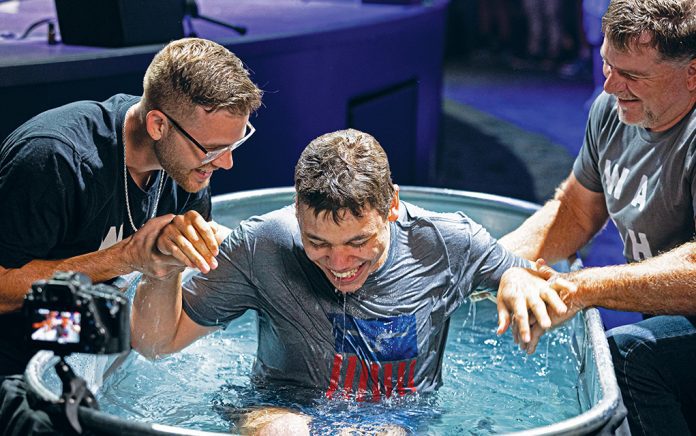Can you share a little bit about where Realife is located?
Our church sits right on U.S. 40, so you could take it across the United States. It goes right through the heart of downtown Indianapolis. If you got off of the loop and drove east on U.S. 40, you would drive through a really rough part of town, hit a county line and then two miles of cornfields. After the cornfields is our church. We moved out of an 11,000-square-foot building and into an 80,000-square-foot building in a community that is projected to grow by probably 30,000 people over the next 10 years. So, there’s definite growth happening in our community.
What’s Realife’s overarching philosophy on retention?
We are creating a place people love so they can experience a loving God. If people don’t have an experience they love on that first visit, they are not coming back, right? It’s kind of an adult play on children’s ministry—if the kids aren’t having fun, they’re not going to learn anything about Jesus. It’s kind of the same thing with adults. If they’re having a great time, then their hearts are going to be open to what we have to say. It begins with that.
The next culture piece for us is we want everybody to feel needed and known—from a first-time guest to somebody who has been in the church for a decade. And so, all of our processes—as much as possible—are personalized.
What types of things does Realife do to ensure that adults are having a good time?
Every Sunday is different. We look for opportunities to have cupcakes or cookies on Sunday morning. On 4th of July weekend, people get a rocket pop as they leave. We look for excuses to have those kinds of things.
We work really hard to just be super friendly. Everybody from the street to the seat is others-focused, smiling and happy. Every person on our Dream Team, whether they are serving in kids, in the parking lot, at the doors, in the café, in the auditorium or on the worship team—everyone is empowered to give a guest bag to a first-time guest.
How do you know your commitment to having a great first experience is working?
I just met a family who moved here from Southern California. He works for Taco Bell corporate, and they’ve put him here for at least five years. I asked him, “Why do you come to Realife?” And he said, “It reminds me of the youth camp that I went to when I was a teen. It’s just so energetic.”
After that first experience, why do you think people keep coming back and taking the next step into the life of your church?
We believe that one of the reasons we’ve seen growth is because the next steps are very clear. You can join a small group no matter what. You don’t even have to go to our church. But once you’re attending church and start asking questions, there is only one answer to all of those: Growth Track. There’s no pizza with the pastors, no newcomers’ dinner, no guest gathering in the hospitality room. I’m not saying those things are bad. We’ve done all those things, and just decided it needs to be clearer. We jokingly say, If you want to know how to use the bathroom: Growth Track.
What’s one of Realife’s challenges as you look to the future?
We’re wrestling with church growth and disciple making. You can grow a crowd and not make disciples. Jesus didn’t say to go into all the world and have great weekend services. He didn’t say go into all the world and do solid children’s ministry. He said, “Go into all the world and make disciples.” So, discipleship is a long play. And you know, someone told me several years ago that it’s not hard to grow a church—just tell me how much money you have.
One of our biggest weekends of the year is Candy Palooza. We didn’t come up with that idea. I think it came from River Valley [Church] in Minnesota. But all we do is give away a bunch of candy and it’s like the third-biggest weekend of the year. Well, in some ways that’s awesome. And in other ways, that’s stupid. Because that’s not building a church. That’s just building a crowd. Now we will use that to start relationships with people so that we can get on a discipleship journey with them. But we are always wanting to make sure that we’re in the disciple-making business, not in the crowd-building business.

